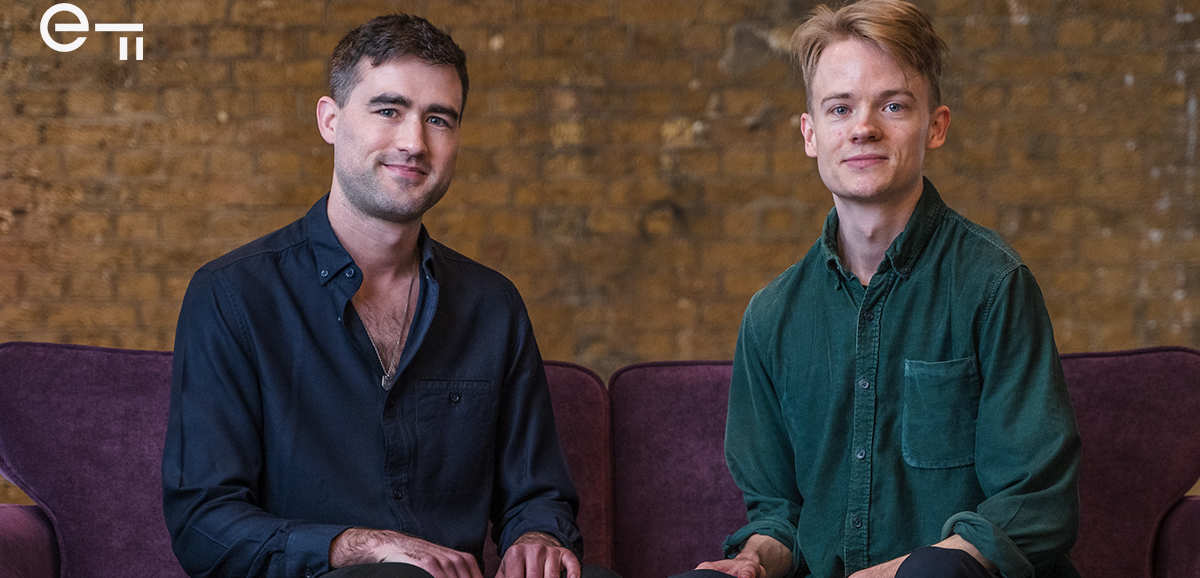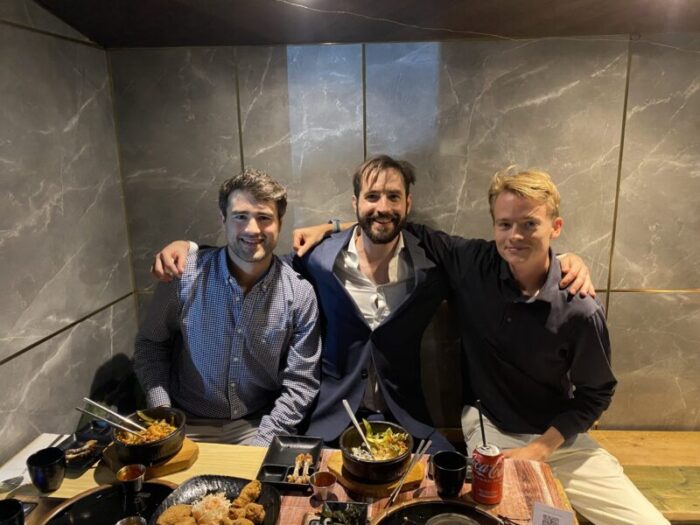Background of PentaBind
Q: Can you provide an overview of PentaBind and your experience in the industry?
A: Absolutely, I’d be happy to share. I established PentaBind, with my colleague and CTO Phil Haynes (our third co-founder Miguel Gonzalez (Chief AI Officer) joined after the program) during the first week of my time with Entrepreneurs First, marking it as my third entrepreneurial venture. With a background of running two companies prior to this and eight years of experience in the industry, I came well-prepared. PentaBind operates in the biotechnology space, focusing on AI drug discovery. We leverage our custom-built AI platform to design new therapeutic drugs aimed at treating various diseases. Additionally, we maintain our own laboratory, which plays a crucial role in generating data to train our AI systems.
Decision to Join Entrepreneurs First
Q: What motivated you to apply to Entrepreneurs First?
A: My journey before joining Entrepreneurs First was quite international, as I spent three years in China working on my first company. However, the advent of Covid changed many things, and I wanted to expand my network back in London. Having been away for several years, my primary goals were to find a business partner who shared my vision and passion and to connect with other entrepreneurs and investors in the community. Entrepreneurs First was an excellent opportunity to fulfill these objectives and grow my professional network meaningfully.
Entrepreneurs First Application Process
Q: Can you briefly describe the steps you went through during the application process?
A: The application process kicked off with me filling out an online form. Following that, I went through a series of interviews. I believe there were two in total, though I admit my memory might be a bit hazy on the details. The first interview was about half an hour long and focused on my personality type. The goal was to ascertain whether I possessed the right characteristics to be an entrepreneur. Having founded two companies before this, I felt reasonably confident in this part of the process. The second interview delved into my background, aiming to understand whether I was more inclined toward business or technology. It also explored what kind of role I envisioned for myself in the new company. These interviews were crucial steps in determining my fit for the program and helped set the stage for my journey with Entrepreneurs First.
Q: Do you have any advice for potential founders who are considering applying to Entrepreneurs First?
A: Given my role as CEO in the venture, I would emphasize the importance of having solid examples to showcase your abilities. If you’ve previously held a sales position, be prepared to talk about your experiences selling a product. If you’ve started a company before, that’s even better—describe that journey and the skills you developed along the way.
However, if you haven’t done either of those, don’t be discouraged. You could also draw upon experiences where you’ve set up an organization, be it a charity or any other type of group. The key here is to demonstrate that you have a vision, the ability to inspire others, and the practical skills to turn your vision into a tangible plan and then execute it. These are all transferable skills that are highly valued in entrepreneurship. So, focus on showcasing your vision, leadership, and execution abilities, regardless of the context in which they were developed.
Post-Acceptance at Entrepreneurs First
Q: Can you describe what happened once you were accepted into Entrepreneurs First?
A: After getting accepted, our journey kicked off with a blend of virtual and in-person engagements. Initially, we had some online calls to familiarize ourselves with the program and its offerings, followed by a Q&A session. A couple of weeks later, we gathered at Entrepreneurs First’s London location for an Organiser Weekend. This weekend served as an immersive introduction to the program’s structure, interspersed with various opportunities for networking and team building. We participated in team-based research activities, presenting our ideas to the larger group, and even engaged in a speed dating exercise to quickly connect with fellow participants, categorized as potential CEOs and CTOs based on our backgrounds.
A crucial insight I gathered from this experience is that while Entrepreneurs First generally encourages the pairing of a CEO with a CTO, there have been instances where two CTOs have successfully partnered. However, they place significant importance on having someone with commercial experience on the team. It’s also worth noting that they discourage forming groups of three or working solo. However, there are exceptions, especially if an individual has already made substantial progress on their idea before joining the program.
During this intensive weekend, I met my current co-founder, and together, we laid the groundwork for PentaBind, marking the beginning of our exciting entrepreneurial journey.
Q: How does the funding process work within the Entrepreneurs First program?
A: Following the initial three-month period of team formation and idea development, we had the opportunity to pitch our venture to the Entrepreneurs First Investment Committee. This committee, comprising partners from the Entrepreneurs First Fund, assessed our progress, team dynamics, and the potential market for our idea. If they deemed our progress satisfactory and saw potential in our venture, they would offer us an investment deal. This deal is standardized across all Entrepreneurs First companies, amounting to a £120,000 investment. However, it’s important to note that there’s a fee for participating in the program, resulting in £80,000 in cash for the startup, while the full £120,000 is recorded on paper as an investment.
The investment takes the form of a convertible loan note, with terms that generally translate to about 10% of the company’s equity when it converts during the next investment round. This financial support played a crucial role in getting our venture, PentaBind, off the ground, providing us with the initial capital required to start turning our ideas into a tangible business.
Key Takeaways from the Entrepreneurs First Program
Q: Aside from financial support, what other significant benefits did you gain from participating in the Entrepreneurs First program?
A: One of the standout advantages for me was the unparalleled opportunity to establish a robust network within the biotech industry. Having spent a substantial amount of time abroad, this program served as a gateway to connect with key players and innovative startups in the biotech sector, particularly in London. The connections I made during the program have proven invaluable, extending support, advice, and potential investor introductions even years later. We’ve fostered a sense of community where we actively help each other navigate the complexities of the startup world.
Another crucial benefit was the structured environment and accountability the program provided. Starting a company is fraught with uncertainties and challenges, and Entrepreneurs First offered a framework that propelled us to work efficiently and address critical issues head-on. They emphasized the importance of tackling the most daunting challenges early on, urging us to ‘run into the spike’ and confront the potential deal-breakers to ascertain the viability of our business idea. This approach ensured that we were not just making progress, but also moving in the right direction, setting a solid foundation for our venture, PentaBind.
Q: Could you share a personal story that surprised or inspired you, perhaps an “aha” moment related to your accountability partner?
A: Absolutely, thinking about it now, my “aha” moment might be related to my business partner. I wouldn’t pinpoint a specific incident, but there was definitely a distinct feeling that emerged when I met him. It was clear to me that he was a person of integrity, someone with strong values and a positive outlook on the world. After spending just a few days working together, I could tell that he was genuine and trustworthy. In the business world, especially in entrepreneurship, you come across all sorts of people. Some are driven by ego, and some are in it for the wrong reasons, perhaps just chasing financial success. But for me, the crucial factor was finding someone honest, someone I’d want to spend a considerable amount of time with, and someone whose values align with mine. It was in these early days of collaboration that I realized, “This is the person I want to build a company with,” even though at that point, we hadn’t settled on a specific idea yet.
So in a sense, that was my “aha” moment. Realizing the importance of aligning values in a business partnership was a game-changer for me. It wasn’t just about the skills or the business idea; it was about the person and their worldview. I realized that these are the aspects that truly matter when choosing a co-founder.
Current Status of the Company After the Program
Q: Can you share the current status of your company post-program?
A: It’s quite a journey starting a company with someone who was initially a stranger. Looking at where we are today, I’m proud to say we’ve built an incredibly powerful artificial intelligence platform, and we believe we’ve amassed the largest dataset of its kind in aptamer and protein data. On the business side of things, we are now generating revenues through our subsidiary company. Additionally, we’re at an exciting juncture as our first drug assets are nearing the testing phase, which is scheduled to happen in just a few months. It’s been a remarkable journey, and we’ve seen substantial progress since the end of the Entrepreneurs First program.
Q: Can you talk about your plans for growing the team and hiring new people in the near future?
A: We’re on track to expand our team significantly. Currently, we’re in the midst of raising funding, and once that’s completed, our hiring process will kick into full gear. We are aiming to triple our size, bringing our team to just under 10 people by next year. In terms of areas we’re looking to hire for, our immediate focus will be on staffing up our wet laboratory, where all our scientific experiments take place. We’re also aiming to bolster our AI capabilities with new talent. Additionally, on the business side, we’re planning to bring in someone to take on a commercial role within our subsidiary. So, it’s going to be a mix of technical and commercial roles as we gear up for this exciting phase of growth.
Final Advice for Prospective Entrepreneurs
Q: Do you have any advice for aspiring founders considering applying to Entrepreneurs First?
A: Entrepreneurs First offers a truly unique program that significantly reduces the risks associated with the early stages of starting a business, brainstorming a viable business idea, and finding a trustworthy business partner. When I participated, they provided a £6,000 stipend for three months, which means you essentially get paid to develop your business idea. The program brings together a cohort of highly talented individuals from diverse backgrounds including science, engineering, and business, providing a rich pool of potential co-founders.
From my personal experience, having founded two companies before this, I can attest to the challenges of entrepreneurship. It’s an incredibly tough journey, and Entrepreneurs First supports you through it with their resources, network, and expertise. They have a wealth of experience with a wide variety of companies, making them well-equipped to guide you through the process. I wholeheartedly recommend the program to any aspiring entrepreneur. It’s a fantastic opportunity, and it has the potential to significantly accelerate your progress.


